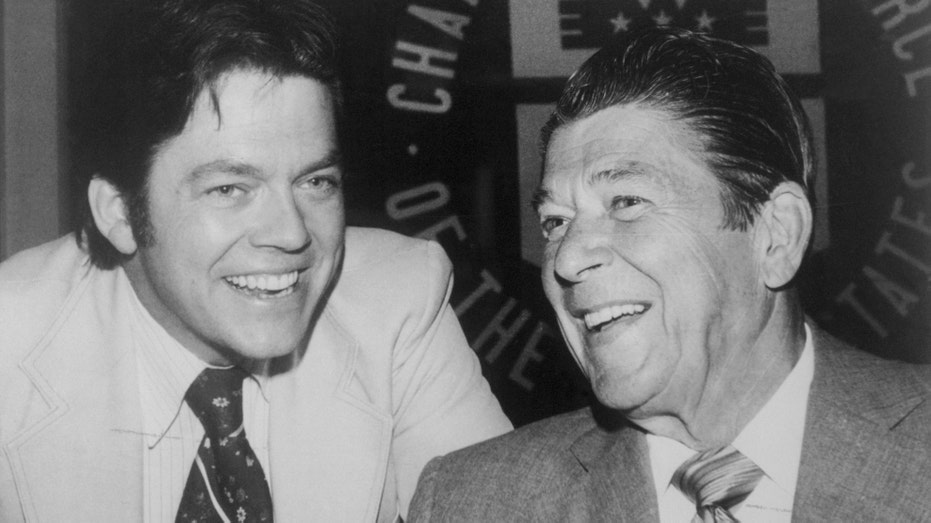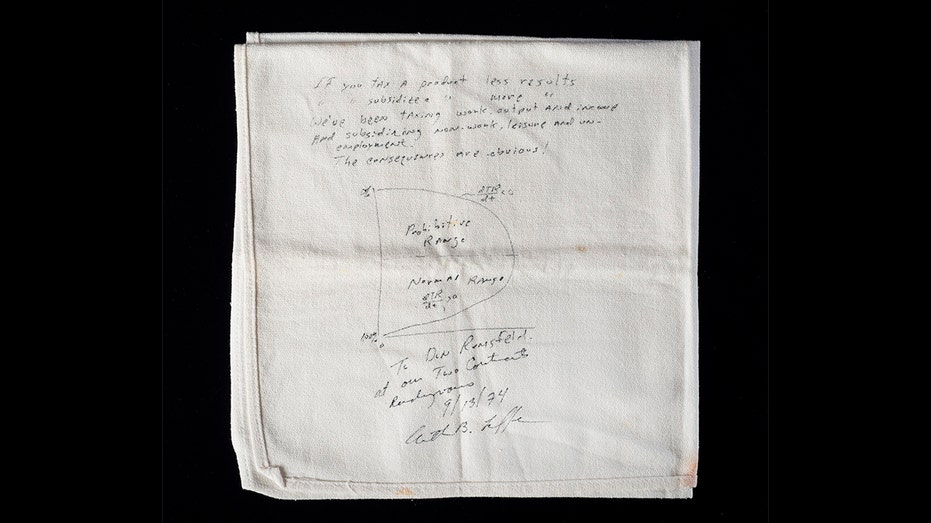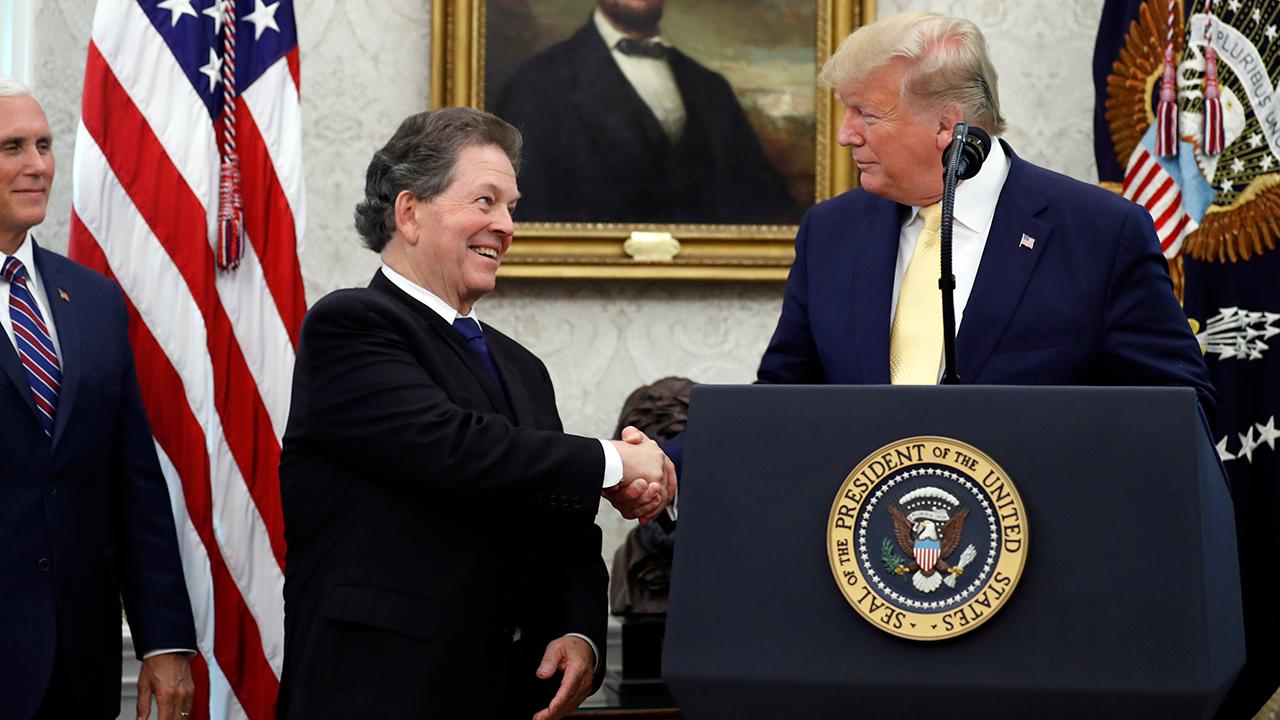Art Laffer, 'Trumponomics' author, awarded Presidential Medal of Freedom
President Trump values his opinion, just as President Ronald Reagan did throughout the 1980s.
On Wednesday, Art Laffer, 78, received the Presidential Medal of Freedom, the nation’s highest civilian honor, at the White House in a ceremony hosted by longtime friend President Trump. A champion of low taxes and tax cuts, he has earned a reputation that has made him one of America’s most noted economic advisers to several U.S. presidents.
"I've never been so overwhelmed in my life. I'm just so pleased and honored. I don't deserve it, but I'm not giving it back," Laffer told FOX Business' Trish Regan after the event.
FOX Business takes a look at Laffer’s career, which remains very much in full swing.
President Donald Trump
Laffer was an adviser on Trump's 2016 campaign, helping craft his tax policy, which would eventually become The Tax Cuts and Jobs Act of 2017 -- widely praised by America's CEOs who celebrated the historic lowering of corporate taxes to 21 percent from 35 percent. The move prompted many of the largest S&P 500 companies, including AT&T and Walmart, to raise wages, benefits and promise future job creation.
| Ticker | Security | Last | Change | Change % |
|---|---|---|---|---|
| T | AT&T INC. | 27.11 | -0.02 | -0.07% |
| WMT | WALMART INC. | 129.02 | -2.16 | -1.65% |
| AAPL | APPLE INC. | 274.62 | -3.24 | -1.17% |
Apple, the nation’s largest taxpayer, announced it would invest over $350 billion in the U.S. economy over the next five years due to the tax changes.
Trumponomics
In October 2018, Laffer, along with fellow free markets economist Steven Moore, penned the book "Trumponomics," which detailed the president's views on economic policies aimed at getting the U.S. economy back on track. Larry Kudlow, who heads the National Economic Council, wrote the book's forward.
Moore would go on to become a favorite for filling one of the vacant governor seats on the Federal Reserve, only to withdraw his interest, telling FOX Business' Neil Cavuto in May, “It was very disappointing that this couldn't go forward but you know the fact is that this kind of sleaze campaign over the last three or four weeks was just really too tough for me and my family and you know we just decided it was much better for Donald Trump to select someone who doesn't have a 30-year paper trail."
Moore would go on to recommend Laffer to replace Kevin Hassett, outgoing chair of the Council of Economic Advisers. “I know from talking to the president that he thinks that Laffer is the best economist in the country – he would love to have Laffer,” Moore told FOX Business. “The question is, what you and I need to do, is put the pressure on Laffer to accept the job," he said.
Laffer later responded, telling FOX Business, "It 'ain't' going to happen."

(Original Caption) New York: Arthur Latter (L) director of Center for the Study of Private Enterprise, University Southern California, and Ronald Reagan, former California governor.
Ronald Reagan
Laffer spearheaded the Reagan administration’s economic agenda in the 1980s and crafted Reagan’s 1980 campaign plan to chop federal income tax rates, which at the time topped out at 70 percent. That was the plan George H.W. Bush dubbed “voodoo economics” in the primaries. The Laffer Curve and supply-side economics served as the foundation for Reaganomics in the 1980s when Laffer served on the President's Economic Policy Advisory Board from 1981 to 1989. Laffer was a member of President Reagan's Economic Policy Advisory Board for both of his two terms (1981-1989). He was a member of the Executive Committee of the Reagan/Bush Finance Committee in 1984 and was a founding member of the Reagan Executive Advisory Committee for the presidential race of 1980. He also advised Prime Minister Margaret Thatcher on fiscal policy in the U.K. during the 1980s, as detailed by several publications.

Napkin with sketch of Laffer Curve. 2013.0041.01.
Laffer Curve
A napkin scribble illustrating how, in Laffer's view, lower taxes would lift economic activity, is now displayed in the Smithsonian. As the story goes, in 1974 Laffer was joined by journalist Jude Wanniski and politicians Dick Cheney and Don Rumsfeld. Laffer argued that lowering taxes would increase economic activity. The napkin reads, “If you tax a product less results/ If you subsidize a product more results./ We've been taxing work, output and income and subsidizing non-work, leisure and un-/employment./The consequences are obvious!” with an image of the Laffer curve in the middle. The bottom of the napkin reads To Don Rumsfeld/at our Two Continents/Rendezvous/ 9/13/74/Art B. Laffer" as described on the Smithsonian's website.
CLICK HERE TO GET THE FOX BUSINESS APP
Education & Personal Life
Laffer received a B.A. in economics from Yale University in 1963. He received an MBA and a Ph.D. in economics from Stanford University in 1965 and 1972, respectively. He was born Arthur Betz Laffer, in Youngstown, Ohio, on Aug. 14, 1940.




















